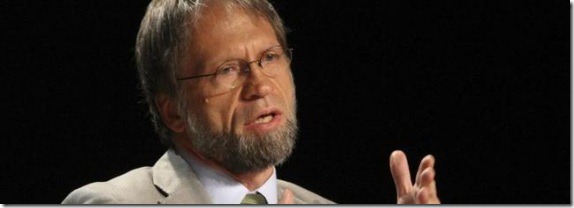Know Your Colombian Presidential Candidates: Antanas Mockus
Colombians are currently participating in the process to elect their next president (until 5pm local time this afternoon). One of the front-runners in the process, and a likely candidate in the second round, is Green Party (Partido Verde) candidate, Antanas Mockus. Mockus is the son of Lithuanian immigrants and is a former mathematics professor and rector at the National University of Colombia.
He first entered politics in 1994 when he ran for, and won, the office of mayor of Bogotá, arguably the second most prominent elected office in Colombia after the presidency. He served two non-consecutive terms in that office (95-97 and 01-03)—consecutive terms are not allowed. He was a successful and popular mayor—indeed, one of the most popular and successful in Bogotá’s history. Given this background, calling him an “outsider” (as I have often seen in the US press) is a bit misleading. He did not come out of nowhere (and has run for president before). He is, however, from outside of the traditional political establishment from whence comes his chief rival, Juan Manuel Santos.
Building on his time as mayor of Bogotá he can actually lay some personal claim to some of the general successes that Colombia has been experiencing during the Uribe era, which has given him some credibility that other candidates might not have had in facing an uribista in the contest. There is a general consensus that Bogotá has radically improved since 1994 and that Mockus’ time in office is part of that change. While anecdotal, I can personally attest, as a resident of the city from mid-1994 to mid-1995 and having just visited in March of 2010, that the city is a substantially different place—and much of what is better (pollution, liter, traffic, general atmosphere and development) are all things that Mockus specifically targeted and started addressing when he was elected. Indeed, the Green Party itself is largely built on the notion of success in Bogotá’s transformation, as all three of its pre-candidates for the presidency (Mockus, Enrique Peñalosa, and Lucho Garzón) were all former mayors during most of the time noted above (1995-2010). Further, it’s VP nominee, Sergio Fajardo, is the popular ex-mayor of MedellÃn.
To get a sense of their political argument, so to speak, I would recommend viewing the following commercial. You don’t need to speak or read Spanish to understand it (most of it consists of music and images), save for the parting slogan “Hicimos Ciudad, Haremos Pais,” which translates: “We Made a City, We Will Make a Country.”
Many may assume that being a Green Party nominee means that his candidacy is primarily focused on the environment (it isn’t) and that he is Colombia’s Ralph Nader (he’s not). Indeed, the picture is far more complex. Depending on what one is talking about, Mockus could be considered center-left or center. Indeed, some of his more left-leaning critics consider him to be too right-leaning. He has campaigned on maintaining Uribe’s security policies, but with more transparency and more attention to human rights. As I wrote earlier in the month:
Mockus is promising not just Uribe’s ‘democratic security’ but, rather ‘democratic legality’ as well—a delineation that will appeal to many Colombians. here is little doubt that along with Uribe’s successes have come some serious questions and scandals, such as the ongoing investigation of wiretapping and other questionable activities by the DAS1 as well as the false positives scandal2 (amongst other things3 ).
To get a vague sense of his politics and approach, I would note the following from an NPR interview:
FORERO: Arias says Mockus brings new ideas, renovation, change. Weeks ago, polls show that Uribe’s presumptive heir former defense minister, Juan Manuel Santos, would win big, and then Mockus skyrocketed, thanks in part to a youth movement spreading the word on Facebook. Now, the outcome is anybody’s guess, that despite the fact that Mockus is a little bit strange, as he himself put it.
He wears an Amish-style beard, quotes Kierkegaard and Nietzsche. Mockus is also hard to pin down ideologically. He recalled that as mayor, he privatized utilities, trimmed bureaucracy, strengthened the police. He also raised taxes and increased social spending.
Mr. MOCKUS: It’s like taking the best idea of the Republicans and the best ideas of the Democrats and making a sort of adapted mixture.
Mockus is an intellectual, but also pragmatic and not stridently ideological.
A key problem for Mockus, should he be elected, is that his party has a very small presence in the Congress and he would face an opposition coalition led by La U and the Conservative Party.
Previous posts in this series:
